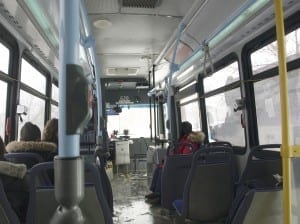Students vote Yes on U-Pass

The U-Pass will now enter the negotiation phase
On Thursday, March 19, University of Regina students voted Yes to the U-Pass in the annual University of Regina Students’ Union’s (URSU) 2015 elections. The referendum vote passed by a margin of 242 votes. The Yes side received 1520 votes, the no side 1278 votes.
Plans for the U-Pass at the U of R began in April 2009. David Vanderberg, who spearheaded the Yes side of the referendum, was a member of the Regina Green Ride Transit Network, a group that looks into sustainable transport.
“At that time, we were researching carpooling and rideshare programs, but then the news started getting out that a new dorm was going to be built and we thought, wow, this is really going to upset the parking situation on campus, so we started talking U-Pass.”
It was at this point conversations with URSU and people involved in the 2009 U-pass campaign started.
Plans were formalized in October 2013, when monthly meetings between Regina Transit, City councillors, the U of R President’s Office, U of R Facilities Management, and URSU began.
Though there was no official No side, there several reasons not to have voted for the U-Pass
Before the referendum passed, the U-Pass committee had talked to City councillors, the Mayor, U of R President and Provost, Regina Transit and URSU.
“The city made it pretty clear from the beginning that they didn’t want to get burnt like they did in 2009,” Vanderberg explained. “They added some routes in preparation for a successful U-Pass campaign, and it failed, so they’ve maintained an officially neutral stance through the referendum period. Obviously we’ve had discussions with Regina Transit regarding what the program could look like, and we’ve laid down the details of what the U-Pass could look like, but we were a little bit handcuffed as far as negotiating precise terms, because the City wouldn’t officially negotiate until the student body passed the referendum.”
Now it’s up to URSU and the city to “get to the table.”
During campaigning, an official No side was not established. Vanderberg thinks this is because “the arguments for a U-Pass represented facts while the arguments against a U-Pass represented personal opinions.” There was opposition to U-Pass at the polls, but ultimately the U-Pass was successful.
“There wasn’t one single unifying reason to vote against the U-Pass; a single unifying fact that a group was able to rally behind and say ‘Don’t vote U-Pass because of X reason.’ On the other hand, we had two very strong reasons to fight for a U-Pass, facts which transcended personal opinion.”
These reasons are loss of parking and an increase in bus fares. With the new residences the university lost over 400 parking spots. And, according to Vanderberg this year, Regina transit users saw a “48 per cent increase in bus fares. These two factors touch pretty much every student on campus. The reasons to vote against the U-Pass becomes pretty slim. The opposing reasons are still definitely there, but they boil down to personal reasons.”
Vanderberg says he “wasn’t surprised” to hear the referendum had passed.
“The car-centric way of commuting is becoming less viable and [students] are realizing that we need to be forward thinking in finding alternative options.”
The plans now are to start negotiations with the City.
“We have a meeting this week already with Regina Transit officials to get the ball rolling,” said Vanderberg.
Vanderberg closed by saying that changes aren’t finished when it comes to sustainable transportation.
“Once we get the U-Pass firmly established, our group hopes to continue researching a ridesharing network that we’ve started between Regina and Saskatoon. We’ve already started it up and students are using it. [The Saskatoon route] is heavily traveled and there’s no reason to travel it alone.”









